Many people love to keep cats as pets because of companionship and other reasons.
You may also have this animal in your home because of your children’s wishes.
After all, snuggling with a cat can help them be happy and relaxed.
One of the top habits of a cat is to enter your bed and sleep with you. As per CDC, 50% of people allow this pet animal to sleep with them. However, you may have been advised not to let a cat stay in your bed overnight.
If you are wondering whether you should let your cat share a bed with you or your kids, you have come to the right place. Here is everything you need to know about cats sleeping in your bed.
Jump to:
The Case For Cats Sleeping In Your Bed
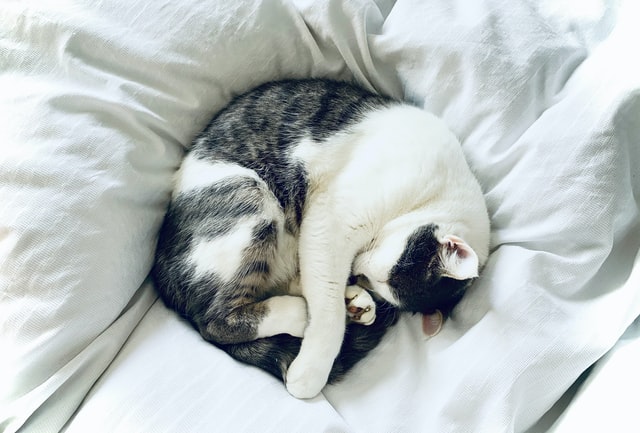
Here are the top benefits that add to the case for cats sleeping in your bed:
Soothing Effect
One of the top reasons people share beds with their cats is the soothing effect the animals have. The pet can relieve your anxiety and help you recover from depression. Besides that, the furry companion can also erase loneliness by being there for you.
A key thing that a cat can help you with is calming you during night terrors. The presence of fur on you may make you feel not lonely while sleeping. This can help you feel safer within your home.
Apart from that, waking up beside a cat can also help you avoid depression in the morning. This is because you don’t have to start your day by realizing that you’re lonely. So sleeping with your furry pet can help you stay happier.
Alleviates Stress
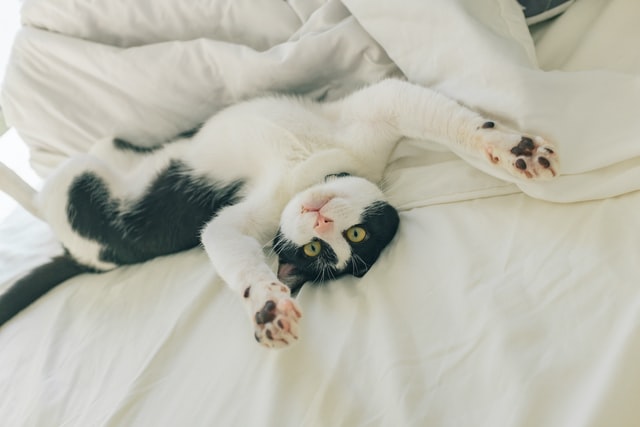
Many doctors recommend that people suffering from stress get a pet for different reasons depending on their condition. The primary reason behind this suggestion is the stress-relieving ability of animals such as cats. Not only that, but the actions that you do with a pet also help with stress alleviation.
Typically, petting and cuddling with a cat can cause your body to release a hormone called oxytocin. This is called the happy hormone because it can help you feel relaxed and joyous. Besides that, sleeping with a cat can also reduce cortisol levels.
The top feature of cortisol is that it is a stress hormone and can make you feel anxious. So sharing your space with your cat can help you become happier and face less stress. Another benefit of this is that you will suffer from fewer blood pressure issues.
Promotes Bonding
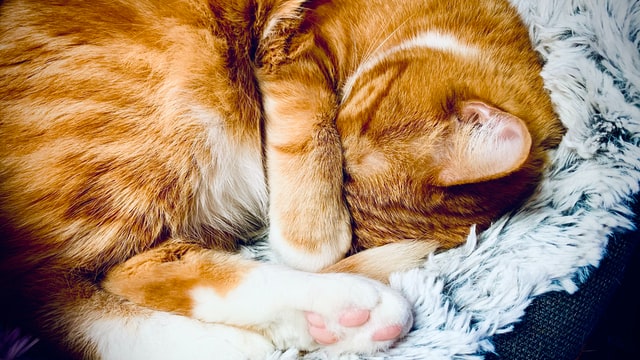
Animals such as cats love to spend time with their guardians and bond with them. This is one of the reasons why you may notice your pet following you around the house. However, bonding with a cat can be tricky if you are not home most of the day.
For instance, you may be working an office job to have a promising career and salary. Of course, your pet wouldn't understand this and can feel neglected. This is why you will have to provide your cat extra attention when home.
A key thing that can help you bond is sharing your bed with the feline creature. You can snuggle with the cat for an extended time and make it feel safer in your home. Besides that, this action will also go a long way in helping your cat feel loved.
Helps You Sleep

Another top benefit of letting a cat in your bed is that it can help you sleep. This is especially true if it's difficult for you to doze off because of insomnia and other issues. The cat's presence can make you feel calmer and more relaxed in bed.
Besides that, cuddling with a cat in bed can also make you cozier, promoting sleep. You should also note that the pet can also offer you warmth if you tend to get cold in bed. This can help you sleep more easily within minutes instead of hours.
Many cats also love to sleep near the torso or on the legs of their guardians. The best part about this is that the animal can act as a weighted blanket. This means that your pet can help you sleep in one position if you move a lot in the bed.
The Case Against Cats Sleeping In Your Bed

Here are the drawbacks that add to the case against cats sleeping in your bed:
Unhealthy Sleep Cycle
Many owners with cats indeed report that they sleep better with their pets in bed. However, the situation can also be the opposite, depending on your feline creature. Some cats love to move around in your bed, which can disturb your sleep.
Aside from that, some cats also purr very loudly when in bed and prevent you from sleeping. Many owners compare this noise with that of human snoring. A 2021 study also shows that cat guardians have a higher ratio of failing at getting at least seven hours of sleep.
You should also remember the top fact that cats are crepuscular. This means that they are highly active during dusk and dawn. So your pet can wake you up hours before you intend to. The overall effect of this is that you may suffer from sleep deprivation because of sharing your bed with a cat.
Bite Wounds

A vital feature of many cats is that they love to play with their owners while in bed. For instance, your pet may prefer to hit you with paws or sit on your face. Besides that, some cats also scratch and bite your feet when under the sheets.
The top thing to note is that the bite may be mild or severe at times. Not only that, but it can be the worst thing if you are already asleep. This is because you will have to wake up and tend to your wound. Besides that, outdoor cats also tend to bring fleas on their fur.
So you should remember that you can also suffer from flea bites by letting your cat sleep with you. This can also lead to severe infections if the bug carries a virus, bacteria, or fungi.
Harmful For Babies
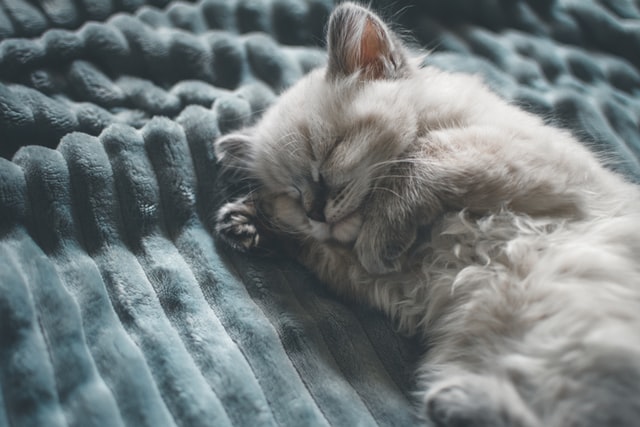
Do you have a cat in your home because of your baby or young kids in the house? If so, they may want to sleep with the pet in their bed because of attachment issues. However, you should avoid this at all costs due to security reasons.
A cat can bite, scratch, or trample your kid after getting scared or startled. Besides that, the animal can also suffocate your baby without intention by lying on its face or chest. This is why all vets recommend not to let cats share a bed with kids and infants.
Besides that, you should remember that kids are more prone to getting diseases. The worst part is that cats can easily transmit illnesses by biting or scratching. Not only that, but your entire household can get affected if your pet brings a virus into the bed.
Dominance Issues
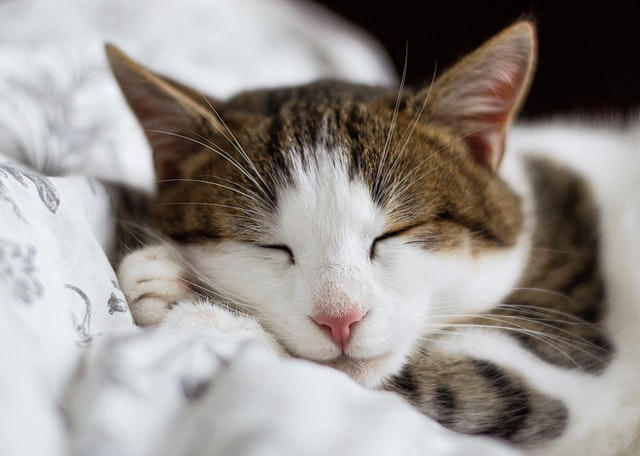
An essential thing to note is that a cat may feel dominant once you let it in your bed. This means the animal can quickly become territorial over the region. Moreover, the feline creature can prevent you from entering your bed by scratching and biting you.
Besides that, cats also tend to form habits and live by following them. This is why it will be tough for you to evict your pet from the bed if it has become used to it. You may also have to resort to extreme measures to remove your cat from the bed.
For instance, you may have to lock out the animal from your bedroom forcefully. Keep in mind that this can harm your relationship with your cat. So the pet may become upset or hostile towards you.
Infections And Allergies

Cats are prone to getting dander because of environmental and hygiene issues. The vital thing you should note about this is that the flakes can act as an allergen. So you may suffer from allergies by letting your cat in the bed.
Besides that, the animal can also harm other allergic people who sleep in your bed. For instance, you may have a friend for a sleepover or a partner. The key thing to note is that the cat may not be in your bed, but its fur and dander will still be on the sheet. So it can quickly induce a human allergy to cats.
Apart from that, cats can also carry mites, fleas, hookworms, and other bugs on their furs. These animals may cause various infections and health issues. This is why you should avoid sharing a bed with a cat, as it increases the risk of facing such problems.
Final Verdict

Having a cat in the bed can help you relax and wake up without being depressed. However, the drawbacks of sharing your space with your pet outweigh the benefits. Not only that, but all vets also recommend avoiding sleeping with your cat in the same bed overnight. Instead let cats use cat beds.




